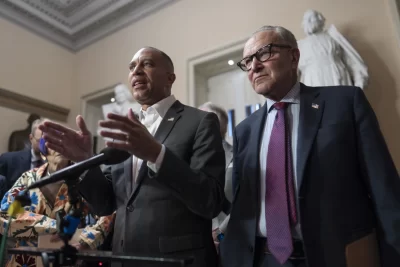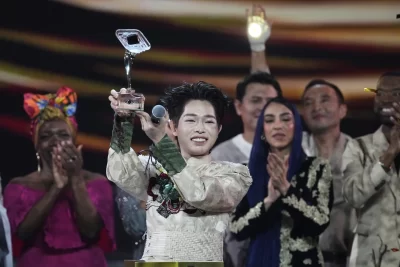
When right-wing populist Javier Milei became Argentina’s president-elect, he dedicated his victory to “The boss,” the nickname he uses for his enigmatic sister, Karina Milei. She is the most important of a trio of influential women surrounding the fiery outsider who shot to the presidency of South America’s second-largest economy.
Karina Milei, who barely speaks in public, was tasked with introducing her brother Sunday night after he won a presidential runoff election with 55.7% of the vote, the highest percentage in a general election since the return of democracy in 1983.
“Without her, none of this would have been possible,” Milei told the crowd that chanted “Olé, olé, boss, boss.”
Milei enjoyed a meteoric rise to the presidency, making the leap from television commentator to lawmaker two years ago. Lacking a group of well-known political advisers, he has surrounded himself with a group of women who are set to be key players in his administration.
Milei rose to the presidency advocating for several unconventional measures, including a proposal to eliminate the Central Bank of Argentina and replace the country’s currency with the U.S. dollar.
It is unclear whether Karina, who has a degree in public relations, will hold a formal position in her brother’s government, but few doubt that she’ll continue to play a key role.
A more public presence in Milei’s administration might be Fátima Flórez, an actress and dancer who gained fame for her impersonation of former President Cristina Fernández de Kirchner, the outgoing vice president. Milei has been in a relationship with Flórez for a few months.
Flórez’s role in the administration is unclear and she has said she has no plans to abandon the stage.
“I can combine my artistic career with the role of first lady,” she said after Milei’s victory.
The president-elect has said he has no plans to ask Flórez to abandon her career, saying in an interview that “I don’t see why I should be so selfish as to deprive Argentines of seeing a show of such magnitude as Fátima’s.”
Also set to play a key role is Vice President-elect Victoria Villarruel, one of the most controversial figures in the new government for her opposition to abortion and marriage equality. She has spoken up in favor of reopening the discussion that led Argentina to legalize abortion in 2020.
Villarruel, a lawyer, has also questioned the legal processes that led to the conviction of former officers for crimes against humanity during the country’s last brutal military dictatorship that ended in 1983.
The daughter of an Army colonel, Villarruel has worked for years to change the narrative about the last military dictatorship. She founded an organization that defended former military officers who were put on trial and participated in rallies involving relatives of victims of terrorist attacks committed in the 1970s by leftist guerilla groups.
During the campaign, Villarruel accompanied Milei in several television interviews, taking the floor to explain several of his proposals. “She is a brilliant woman,” he has said about her.
Milei has said Villarruel will be in charge of the defense and security policies of the future government, saying that “obviously, she will not have a decorative role.”






